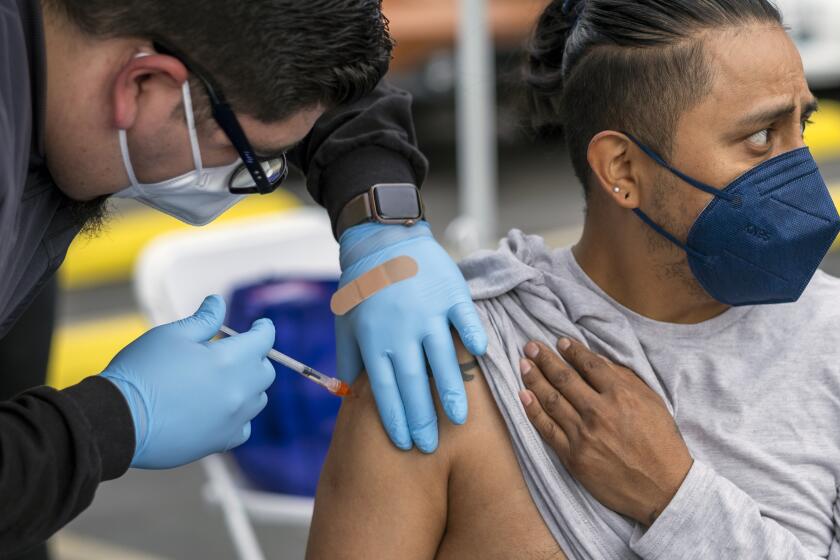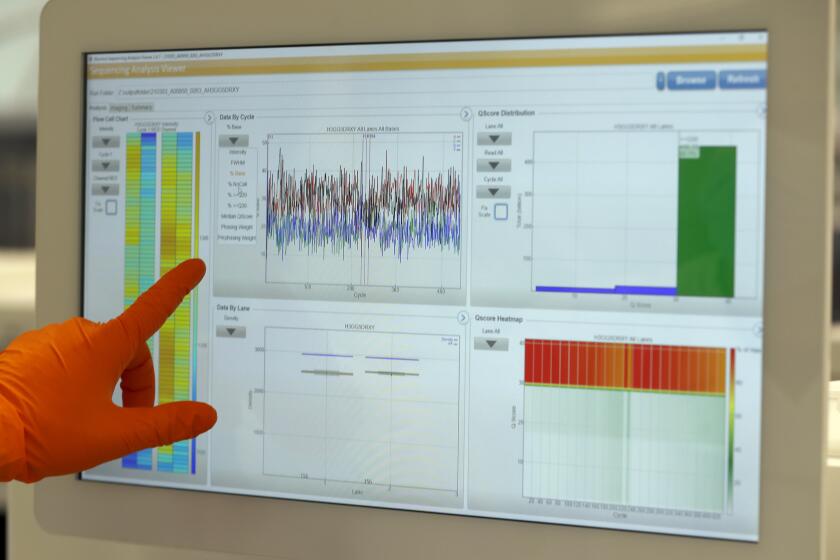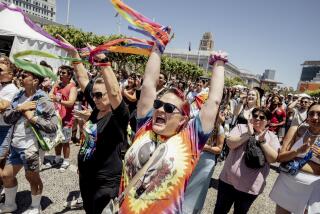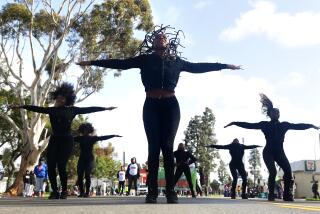‘We needed this’: Big crowds toast St. Patrick’s Day in Savannah for first time in 3 years
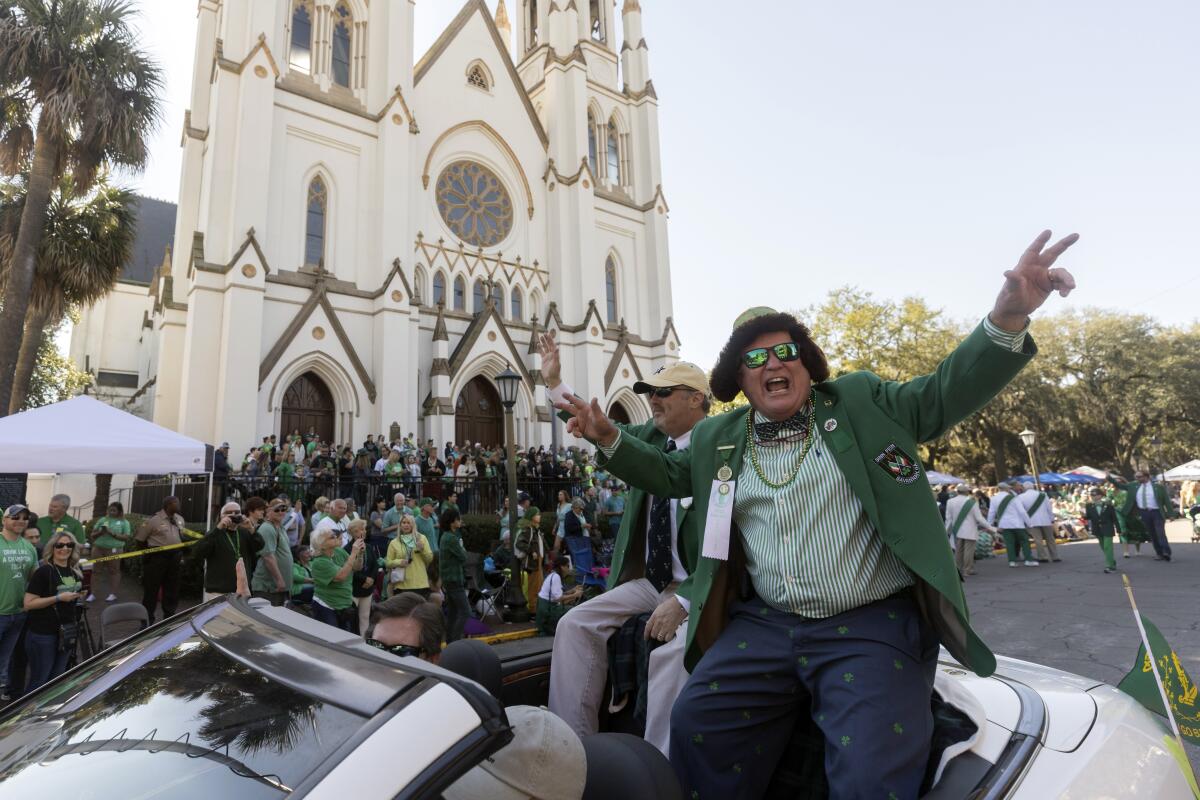
- Share via
SAVANNAH, Ga. — Thousands in green T-shirts, bowler hats, feather boas, with nary a mask in sight, crowded shoulder-to-shoulder along sidewalks and inside bustling bars Thursday as the South’s largest St. Patrick’s Day parade returned in Savannah after a two-year coronavirus hiatus.
“We needed this,” said 41-year-old Trey Parrish, who showed up at oak-shaded Lafayette Square more than a day early to stake out the corner spot where his family, cousins and friends have celebrated for more than two decades.
All around him, revelers in green blazers and party dresses exchanged hugs and handshakes, often with people they had not seen since 2019, the last time Savannah’s 198-year-old parade was held. The crowd erupted in whoops, clapping and cheers as the procession of marching bands, shamrock-decorated floats and convertibles chauffeuring dignitaries arrived early in its route through the city.
Started by Irish immigrants to Georgia’s oldest city in 1824, the St. Patrick’s Day parade has morphed into one of the South’s biggest street parties after Mardi Gras. Hundreds of thousands of residents and tourists jam the sidewalks and oak-shaded squares of the downtown historic district, making the Irish holiday Savannah’s most beloved and profitable event of the year.
Tori Purvis, 46, arrived before dawn to claim a spot near the start of the parade along with her 3-year-old son, Tristan, still wearing his pajamas decorated with leprechaun hats and rainbows. Purvis said she’s been celebrating St. Patrick’s Day in Savannah since childhood, and the only years she recalls not showing up were 2020 and 2021, when the pandemic forced the parade to be canceled.
Health officials battle myths and disinformation in convincing people to get their COVID-19 booster shots.
“I’m not against masks or anything, but it’s nice to see people outside without masks and enjoying their time,” Purvis said. “It’s like a little bit of normalcy is coming back.”
For celebrants lined up inside bars to buy beer or waiting to use portable toilets on the parade route, the COVID-19 pandemic seemed a distant afterthought. A mask mandate for public buildings, one of Savannah’s last remaining restrictions, was allowed to expire March 1. And coronavirus infections in Georgia are at their lowest point since November, and about half their rate a year ago.
Some were even rolling their eyes at city officials who called for women along the parade route to refrain from Savannah’s tradition of rushing up to marching soldiers, musicians and other participants to plant lipstick-smeared kisses on their cheeks.
David Sheahan had three red lipstick prints smeared on his cheeks before the parade began. He said the culprits were his wife and daughter, but he planned on collecting dozens more while marching.
Britain is ending some COVID-19 testing and monitoring programs. Some scientists fear it will complicate efforts to keep tabs on the coronavirus.
“I’m Irish and we have a great immune system, so I have no problem with it,” Sheahan said. He added that he figured most kissing lips would be sterilized “with the alcohol consumption and all that.”
Savannah bars began opening their doors at 7 a.m., with some owners planning to keep pouring until 3 a.m. Friday. Before the parade began Thursday morning, dozens crowded around the U-shaped bar in Pinkie Master’s Lounge, where co-owner Mike Warren rushed to keep up with orders for Guinness, shots of Irish whiskey and a few mixed drinks.
“The city’s jamming,” Warren said. “It’s basically like two or three weeks worth of business in one week.”
Although Savannah’s long St. Patrick’s Day history had seen previous years without parades during the Civil War, World War I and in 1921 during the Irish Revolution, the pandemic marked the first time parades had been canceled in almost a century.
In Lafayette Square, Parrish recalled how his family spent the past two holidays hosting gatherings at home.
“We had board games, card games and lots of food,” Parrish said. “But it wasn’t St. Patrick’s Day.”
More to Read
Sign up for Essential California
The most important California stories and recommendations in your inbox every morning.
You may occasionally receive promotional content from the Los Angeles Times.
